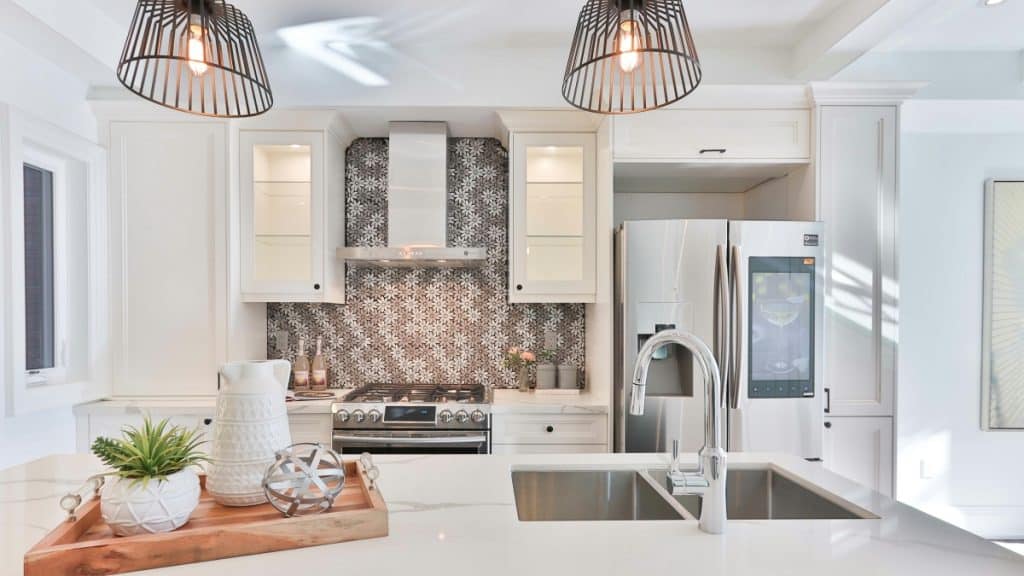As more homeowners turn their attention towards sustainable living, the desire for eco-friendly kitchen countertops has increased. The kitchen, being the heart of most homes, serves as an excellent starting point for green initiatives. In this article, we’ll explore several environmentally friendly options for kitchen countertops that offer both style and sustainability.
Choosing the Right Countertop
When planning an eco-friendly kitchen remodel, it’s crucial to consider various factors in choosing the right countertop material. Evaluating options like durability, maintenance, and environmental impact can help homeowners make informed decisions that align with their sustainability goals.
Bamboo
Bamboo is gaining popularity as a countertop material due to its rapid growth rate and sustainability. Technically a grass, bamboo can be harvested without killing the plant, allowing it to regrow and be ready for another harvest in just a few years. Moreover, it’s naturally resistant to water and stains when properly treated, making it an excellent, durable option for countertops.
Recycled Glass
Countertops made from recycled glass are not only beautiful but also environmentally friendly. These countertops are constructed from post-consumer glass mixed with resins or concrete. The result is a stunning, often terrazzo-like appearance. Besides their aesthetic appeal, recycled glass countertops are incredibly durable and low-maintenance, requiring only regular cleaning to keep them looking their best.
Concrete
When sourced and mixed responsibly, concrete can be an environmentally friendly option for countertops. Adding recycled materials like fly ash or slag can increase its sustainability. Furthermore, concrete countertops offer immense versatility in design, as they can be customized with various stains, dyes, and textures. Although concrete can be prone to cracking, proper sealing and maintenance can prolong its lifespan significantly.
Paper Composite
Made from post-consumer recycled paper, paper composite countertops are gaining traction among eco-conscious homeowners. These countertops are created by layering sheets of paper and soaking them in resin, resulting in a durable and heat-resistant surface. Paper composite countertops come in various colors and textures and are particularly admired for their sleek and contemporary look.
Recycled Aluminum
For a modern and industrial aesthetic, recycled aluminum countertops are a fantastic option. Made from post-industrial scraps, these countertops are not only lightweight and durable but also highly resistant to heat and stains. Plus, aluminum is 100% recyclable, meaning that at the end of its life cycle, it can be recycled again, contributing to a circular economy.
Salvaged Wood
Salvaged or reclaimed wood countertops offer a rustic charm while promoting sustainability. By repurposing wood from old buildings, barns, or even wine barrels, you are essentially giving new life to materials that might otherwise end up in landfills. It’s important to properly treat and seal salvaged wood to ensure its longevity and resistance to moisture.
Cork
Cork is another sustainable material that is making its way into kitchen countertop designs. Harvested from the bark of cork oak trees, cork is renewable and biodegradable. Its natural anti-microbial properties make it a hygienic choice for kitchens. Additionally, its soft, cushion-like texture provides a unique aesthetic and a comfortable work surface.
Soapstone
Although soapstone is not typically viewed as a sustainable material, it is durable and has a long life span, which means it won’t need to be replaced as frequently as other materials. This dense and non-porous stone is resistant to stains and bacteria, making it a practical and sustainable option for eco-friendly kitchens. As a bonus, its natural, matte finish brings a timeless look to any kitchen décor.
Recycled Plastic
Recycled plastic countertops offer a colorful and eco-friendly choice for modern kitchens. Made from post-consumer plastics, such as milk jugs and detergent bottles, these countertops divert plastic waste from landfills. They are available in a wide range of colors and patterns, allowing for versatile design options. Additionally, recycled plastic countertops are durable and easy to maintain, making them a practical solution for busy kitchens.
Conclusion
Choosing an eco-friendly countertop for your kitchen is a step towards a more sustainable lifestyle. Each of the options discussed offers unique benefits, aesthetics, and performance characteristics. From the renewability of bamboo to the durability of recycled aluminum, there is an eco-friendly countertop to suit every taste and kitchen style. Making an informed choice ensures that your kitchen is not only beautiful but also kind to the planet.
